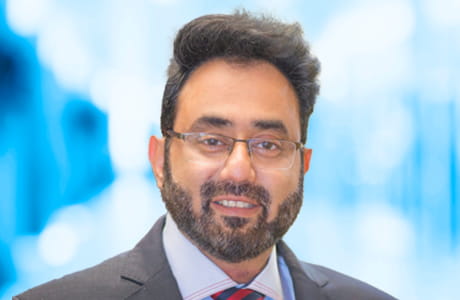
Diversity, equity & inclusion
Creating a culture where you belong.
Geisinger is committed to cultivating a culture that fosters diversity and inclusion. We recognize that our team is our most valuable asset and seek to promote an environment that is welcoming of persons of all races, ethnicities, religious beliefs, genders and sexual orientations. At Geisinger, we celebrate life experiences, authentic personal differences, knowledge, innovation and talent. Within our Graduate Medical Education program, the director of diversity, equity and inclusion — along with our entire faculty — will apply inclusive principles in all settings to advance the institution's efforts to create a welcoming and safe environment for all residents and fellows.
In support of its commitment to diversity, equity and inclusion (DEI), the Accreditation Council for Graduate Medical Education (ACGME) has announced ACGME Equity Matters, a new initiative that introduces a framework for continuous learning and process improvement in the areas of DEI and anti-racism practices.
Geisinger incorporates DEI training for our learners and faculty, to implement and practice ACGME Equity Matters recommendations. We recruit a diverse group of learners and cultivate a culture of inclusivity for everyone.
GME at Geisinger supports and fosters affinity groups and supplies house staff with a platform to discuss matters related to diversity and inclusiveness in a psychologically safe environment. A House Staff Diversity and Inclusion Council, led by residents and fellows and mentored by the Director of Diversity, Equity and Inclusion, Aliasgar Z. Chittalia, MD, MHA, ensures that our residents and fellows have a positive experience during their training.
A letter from the GME Director of Diversity, Equity and Inclusion
Why emphasize diversity, equity and inclusion? We do so to appreciate and value the core individuality of each human being. DEI seeks to highlight what’s unique in everyone and, in the process, enable everyone to attain their full potential.
To create workplaces where everyone can be who they are and feel encouraged to bring their best to work every day, we need to understand the attitudes and habits that get in our way and learn to recognize when to speak up or step in.
Diversity is the recognition, appreciation, respect and utilization of various attributes of every individual.
Diversity in the workplace should be about reflecting all the richness of humanity, different genders and races, abilities, aptitudes, disabilities and backgrounds. It needs to include different ages, ethnicities, and orientations. An often-mentioned paradigm that we should seek to eliminate through increased diversity is to rid our organization of affinity bias, which in simple terms is the tendency to favor someone we perceive to be like us.
Equity refers to fair and just practices and policies that ensure all campus community members can thrive.
Let’s understand an important distinction here; equity is not the same as equality. The underlying notion of equality is treating everyone on an even scale, assuming everyone has the same experiences. Equity is a step up on the pedestal, recognizing structural inequalities, both historic and contemporary, that predetermine success and failure. Equal treatment results in equity only if everyone starts with equal access to opportunities. Promoting equity means giving impetus and direction to impartiality, justice and fairness within policies, procedures and distribution of resources by institutions and organizations.
Inclusion refers to a campus community where all members are and feel respected, have a sense of belonging and are able to participate and achieve to their full potential.
The key to ushering in inclusion is to build on two measures: climate and belonging.
Climate here needs to be understood as “individual’s shared perception of behaviors that are expected and rewarded within a particular organizational context.” An inclusive climate relates to how a team functions and performs based on the quality of social connections, openness to learning, agility, and depth of decision-making. While it is important to ensure that no form of discrimination exists in a workplace, inclusion in this context refers more specifically to individuals’ everyday interactions amongst each other.
Two integral components of creating an inclusive workplace today are to ensure that individuals feel a sense of belonging and a feeling of being valued. Belonging is the intergroup dynamics that make a person feel valued. Poor inter group dynamics feel make an individual feel de-valued and will cause them to retreat and disengage, reducing their ability to give their best performance. There are many reasons people may feel like they don’t belong, but they all stem from a common denominator — unconscious/implicit bias.
In conclusion, remember, “Diversity requires equity, equity requires inclusion and inclusion requires empathy.” Empathy is the primary virtue of a good physician. We’ll cultivate that well here at Geisinger.
- Ali Chittalia, MD, MHA (He/Him)



